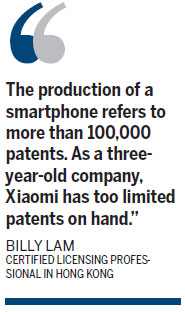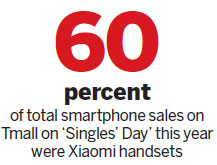Ready for the American dream?
Updated: 2014-12-20 07:30
By Gladdy Chu(HK Edition)
|
|||||||
Xiaomi is poised to enter the US scene. However, a patent row in the Indian market has cast a shadow over the company's overseas prospects. Gladdy Chu reports.
Xiaomi Corp - the world's third-largest smartphone manufacturer - plans to launch its new handset at the Consumer Electronics Show (CES) in Las Vegas next year, marking the US market debut for the fast growing Chinese IT company.
The International CES is a global consumer electronics and consumer technology trade show held every January in the Nevada city.
Market reports suggest that Xiaomi may launch the Mi5, its newest flagship smartphone boasting high-end specifications at a low-end price - like most of the handsets coming out of the Chinese mainland.
However, Xiaomi's recent patent infringements dispute over its expansion into the Indian market may block its plan to tap the Euro-American market.
Earlier this month, the Beijing-based electronics company was banned from importing and selling smartphones in India amid allegations it had illegally used patented technology of telecoms equipment giant Ericsson. A week later, a court in New Delhi temporarily lifted the ban on condition that Xiaomi prepaid 100 rupees ($1.60) to the court as provision for each smartphone with Qualcomm chipsets they had imported until Jan 8, 2015.

Billy Lam, a Certified Licensing Professional in Hong Kong, said there's no problem for Xiaomi in exhibiting new products at the CES, but if the company wants to tap into the US market, it faces a big challenge from international players like Microsoft and Samsung.
"The production of a smartphone refers to more than 100,000 patents," Lam said. "As a three-year-old company, Xiaomi has too limited patents on hand. If they want to expand to the global smartphone market at present, the only way is to buy patents and obtain authorization."
A report by US-based market tracker International Data Corporation showed that Xiaomi's smartphone shipment volume in the third quarter of this year ranked third behind California-based Apple Inc and South Korean giant Samsung Electronics Co.
Speaking on Dec 3 at the APAC Innovation Summit in Hong Kong, Lin Bin, a co-founder and president of Xiaomi, noted that their handsets accounted for more than 60 percent of total smartphone sales on Tmall, a online marketplace of Alibaba Group, at this year's "Singles' Day" - a bargain shopping event hosted every Nov 11 by Alibaba's Taobao.
Despite rapid development and expansion, Lin said the management team has not discussed whether Xiaomi would become the next Apple or Samsung, and does not have plans either for a public offering for the next several years at least.
Xiaomi faces two challenges in competing in the global smartphone market, Lin noted.
"The global market competition is so intense that the success of one generation (of products) will not last to the next," Lin said. "Successful expansion depends on whether we can continually push forward high-quality and cost-effective products on a yearly basis."
International expansion since last year has seen Xiaomi launch its smartphones in Singapore, Malaysia and India, but the key point to observe is whether the mainland strategy can be applied to these markets as well.
"If we look deeply into the business model of Xiaomi, the fact that we're looking at is not only who will buy the smartphones, but also usage habits such as how frequently they open browsers or how many times they play IOT (Internet of Things) application games," Lin said. "We will see if we can replicate usage habits we found on the mainland and take it international."
"In considering expansion, we don't usually look at the profit but the market share we can achieve," Lin said, pointing out that Xiaomi uses three criteria to guide its expansion strategy. The first criterion is market size, and a big market such as India will whet Xiaomi's appetite, Lin indicated.

Xiaomi also tends to choose markets that appreciate the value of its products. "In markets where mobile network carriers have low subsidies for selling smartphones, consumers are more likely to feel the price advantage of Xiaomi among smartphones of the same quality," he said. Xiaomi went global by entering 10 new markets this year, including India, Brazil and Russia. It also set a goal of increasing sales to 100 million phones in 2015, according to an April 23 report from Bloomberg News.
Xiaomi has established more than 100 Mi Zones as physical stores in six cities in India and plans to sell RedMi Note, the first 4G smartphone priced below 10,000 rupees, in the Indian market.
However, the legal problem of patent infringement has, to some extent, slowed its expansion. "Though we're not familiar with the Indian market, we're trying to find out if our mainland strategy will work there," Lin said before the dispute arose.
To speed up global expansion, Xiaomi hired another former Google executive in October as its product manager to lead the research and development (R&D) startup in India.
Lin said Xiaomi may also set up a R&D branch in Hong Kong sometime in the future.
Allen Ma Kam-sing, chief executive officer of Hong Kong Science and Technology Parks Corporation, believes that the vibrant collection of top-tier talents at universities in Hong Kong will provide a strong resource pool for development work.
Contact the writer at gladdy@chinadailyhk.com
(HK Edition 12/20/2014 page6)